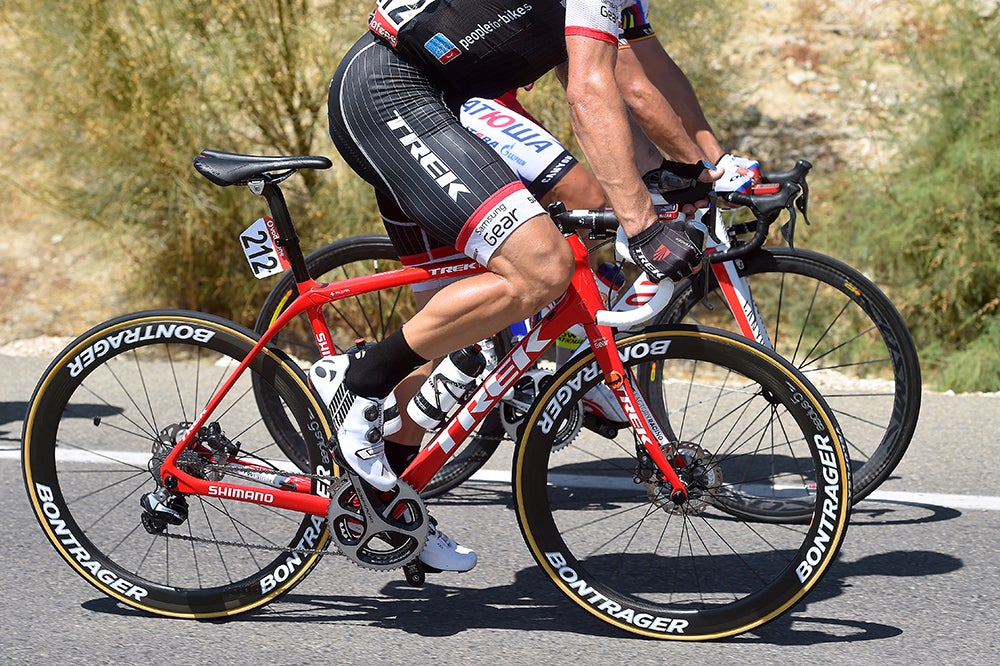Discs are coming to the peloton, but are they right for everyone?

Markel Irizar (Trek Factory Racing) rode a bike with Shimano disc brakes during stage 6 at the Vuelta this year. Photo: Tim De Waele | <a href="http://tdwsport.com" target="_blank">TDWsport.com</a>
Some say the UCI’s approval of disc brakes for 2016 is a preamble to universal adoption — rather than the trial period it is meant to be.
Bless our eternal optimism.
In a rush toward the perceived inevitable, it’s possible the riders in the peloton will ultimately decide discs aren’t for them at all. It is, in fact, possible we won’t see any disc brakes in the peloton by the end of next season.
“I definitely think there’s a chance that could happen,” Trek Road Product Manager Ben Coates told VeloNews. “I don’t know how big of a chance that is. I think it’s more likely that it ends up a mixed peloton.”
Why the skepticism? Perhaps the most glaring issues are weight and aerodynamics, both of which are significant design challenges for manufacturers attempting to capitalize on the superior stopping power of hydraulic disc brakes. “There’s no argument discs work better,” said Coates, “but they’re not better in all scenarios.”
Convincing climbers, or any professional, to run a bike meaningfully over the 6.8kg weight limit will prove difficult. All the bikes Trek has tested to this point — Domane frames with disc mounts — have come in just over 7 kilograms. Coates is confident he can drop that weight. “But I don’t think every manufacturer can make a 6.8kg disc bike. Regardless of the brake performance, the weight up a hill will sit in a rider’s mind… you’re going to have a hard time convincing somebody to get on a disc bike.”
That will rule out grand tour use for some riders, even though rainy descents may be where discs provide the greatest advantage. It points to early adoption on less hilly parcours.
“I think there’s obvious places where the downside of discs are meaningless,” Coates said. Places like Paris-Roubaix. “The one thing that the brakes do offer is that you can get more tire clearance. There’s an avenue there for performance. Currently the teams’ tire size is 27. Is there a place where riding a 30 or 32 or 34 would increase performance?”
Pros are concerned about safety, too. Disc issues can range from simply inconvenient to dangerous. While carbon rims have a history of catastrophic failure, disc brakes tend to be more reliable, especially in ugly conditions. But a disc brake doesn’t necessarily need to fail in order to become a potentially dangerous problem. Brake pump, for example, happens when air is present in the hydraulic lines. Squeeze the brake once and it might come all the way to the bar; squeeze it again and the contact point changes. Now imagine Vincenzo Nibali flying down a mountainside in the Pyrénées. It’s vital for him to know how his brakes will react when he pulls that lever. If the brake lever contacts too soon, he could throw himself over the bars. If the pads contact too late, perhaps he overcooks a turn.
Of course, we wouldn’t be talking about hydraulic disc brakes at all if there weren’t some serious advantages to them. Eliminating a rim brake opens up the potential for wider tires, so it’s likely we’ll see disc brakes on cobble bikes running 30 or 32c tires, or even wider. That’s a significant performance advantage.
SRAM is all in. According to a statement from the company, “Hydraulic disc brakes offer shorter stopping distances and improved brake modulation that helps riders avoid crashes while allowing for faster, yet more controlled descending.” SRAM provided brakes to Team Roompot for testing at certain WorldTour races in 2015, and the team will use disc brake-equipped bikes in 2016.
Perhaps the most likely scenario is that disc brakes end up on the bikes of certain riders rather than entire teams. This creates a logistical headache for team mechanics and directors, but ultimately, a disc brake-equipped bike makes more sense for a high-profile rider who can take a bike change rather than a wheel change mid-stage. A Pro Continental rider with less team support, however, might be stuck on the side of the road lining up the rotor with the caliper, losing precious seconds or even minutes.
“I think there’s an interesting future coming with discs,” Coates said. “There’s no argument discs work better. But they’re not better in all scenarios. I’m looking forward to seeing how it goes down in the pro peloton.”
Caley Fretz contributed to this report